University Jurisprudence Assignment: LAW 214, Semester 2, 2019
VerifiedAdded on 2022/11/13
|9
|2176
|342
Homework Assignment
AI Summary
This Jurisprudence assignment explores key concepts in legal theory. The solution delves into liberal feminism and its concept of formal equality, identifying a significant drawback related to substantive equality and discrimination. It then examines legal moralism, discussing its justification for criminal prohibitions based on morality, alongside critical objections. The assignment also analyzes the nature and importance of rights, highlighting their role in limiting utilitarian reasoning and protecting individual liberties from governmental overreach. Finally, it addresses Robert Nozick's entitlement theory of justice, explaining its principles of acquisition, transfer, and rectification, while also considering criticisms related to self-ownership and wealth distribution. The assignment provides a comprehensive overview of these core jurisprudential ideas.
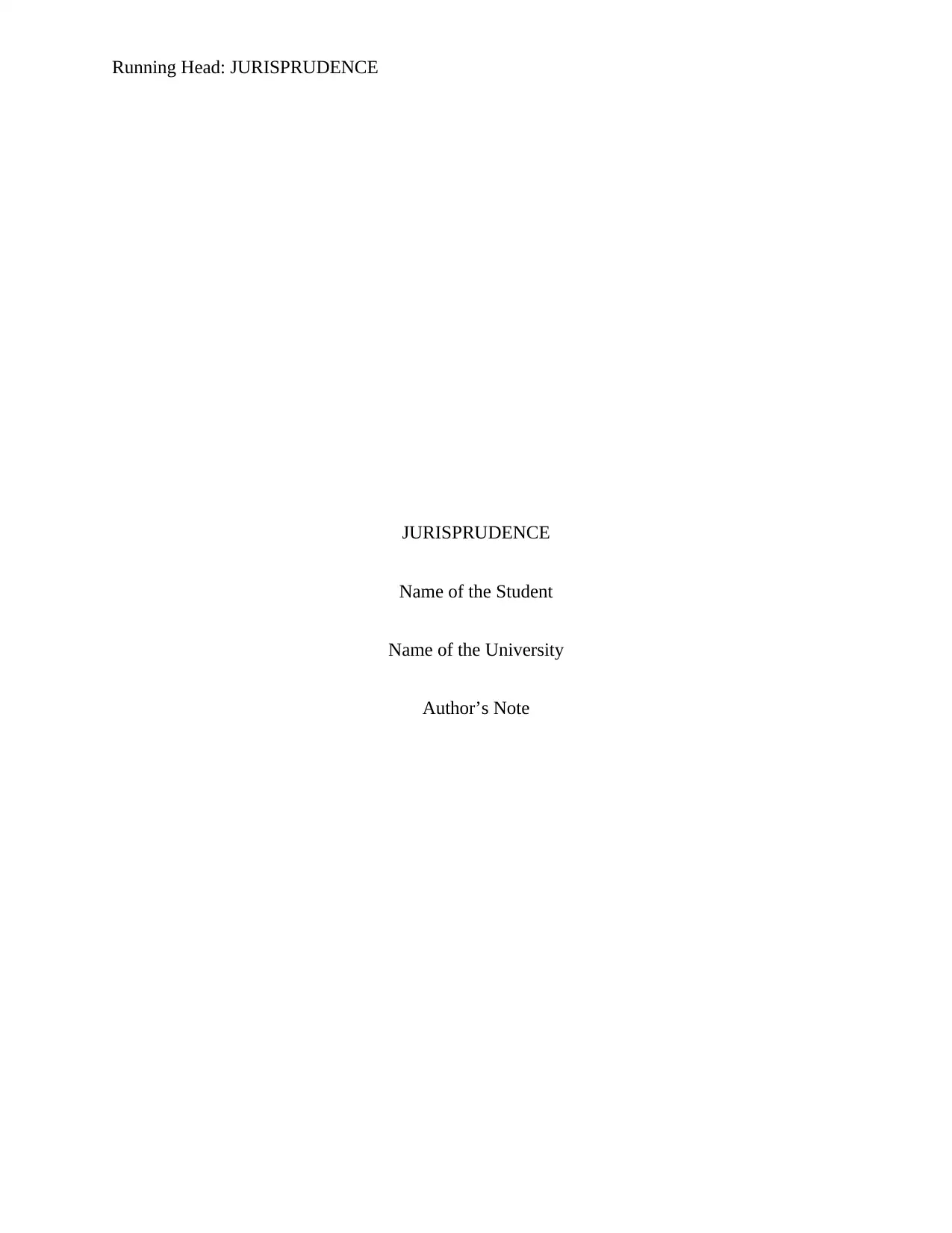
Running Head: JURISPRUDENCE
JURISPRUDENCE
Name of the Student
Name of the University
Author’s Note
JURISPRUDENCE
Name of the Student
Name of the University
Author’s Note
Paraphrase This Document
Need a fresh take? Get an instant paraphrase of this document with our AI Paraphraser
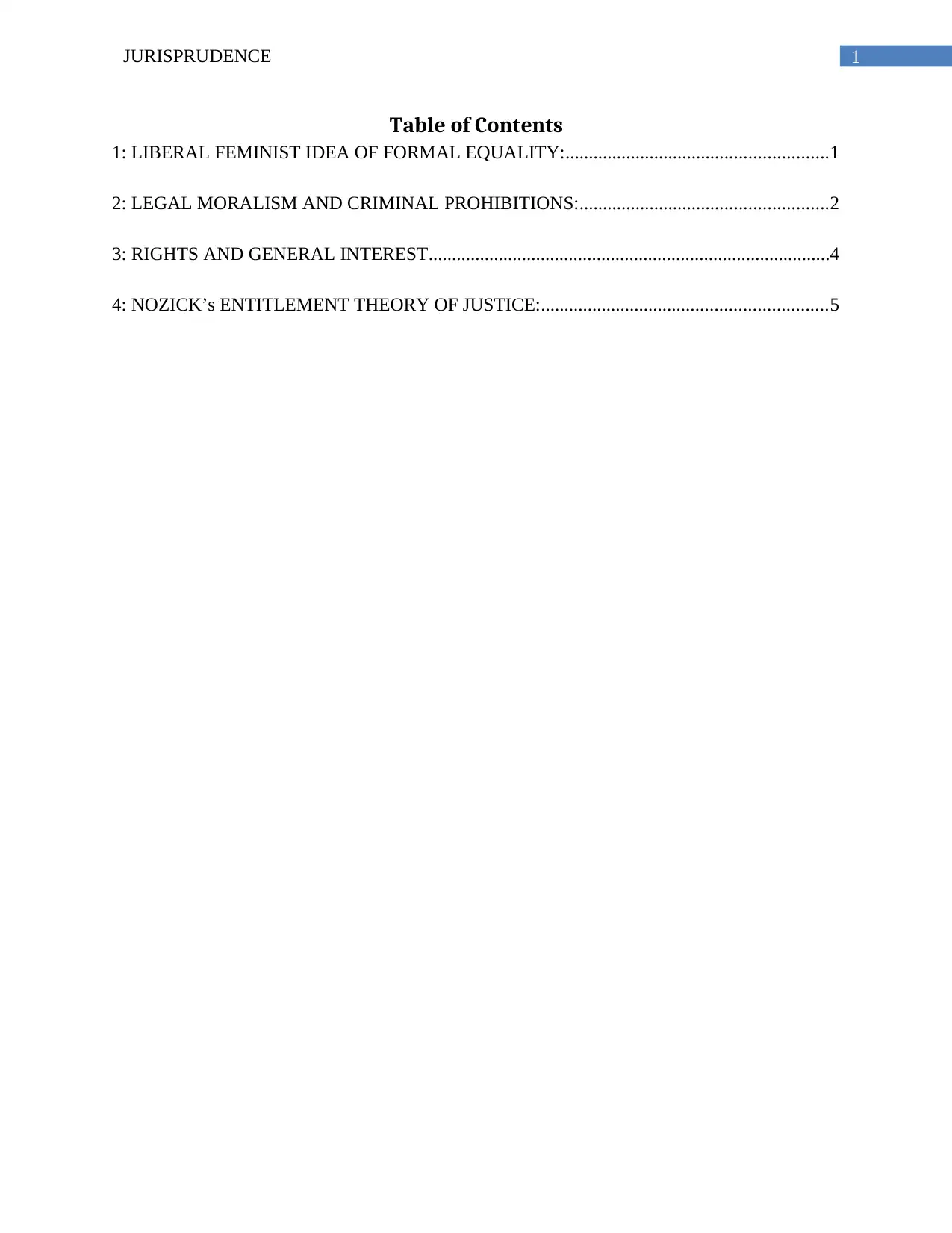
1JURISPRUDENCE
Table of Contents
1: LIBERAL FEMINIST IDEA OF FORMAL EQUALITY:........................................................1
2: LEGAL MORALISM AND CRIMINAL PROHIBITIONS:.....................................................2
3: RIGHTS AND GENERAL INTEREST......................................................................................4
4: NOZICK’s ENTITLEMENT THEORY OF JUSTICE:.............................................................5
Table of Contents
1: LIBERAL FEMINIST IDEA OF FORMAL EQUALITY:........................................................1
2: LEGAL MORALISM AND CRIMINAL PROHIBITIONS:.....................................................2
3: RIGHTS AND GENERAL INTEREST......................................................................................4
4: NOZICK’s ENTITLEMENT THEORY OF JUSTICE:.............................................................5
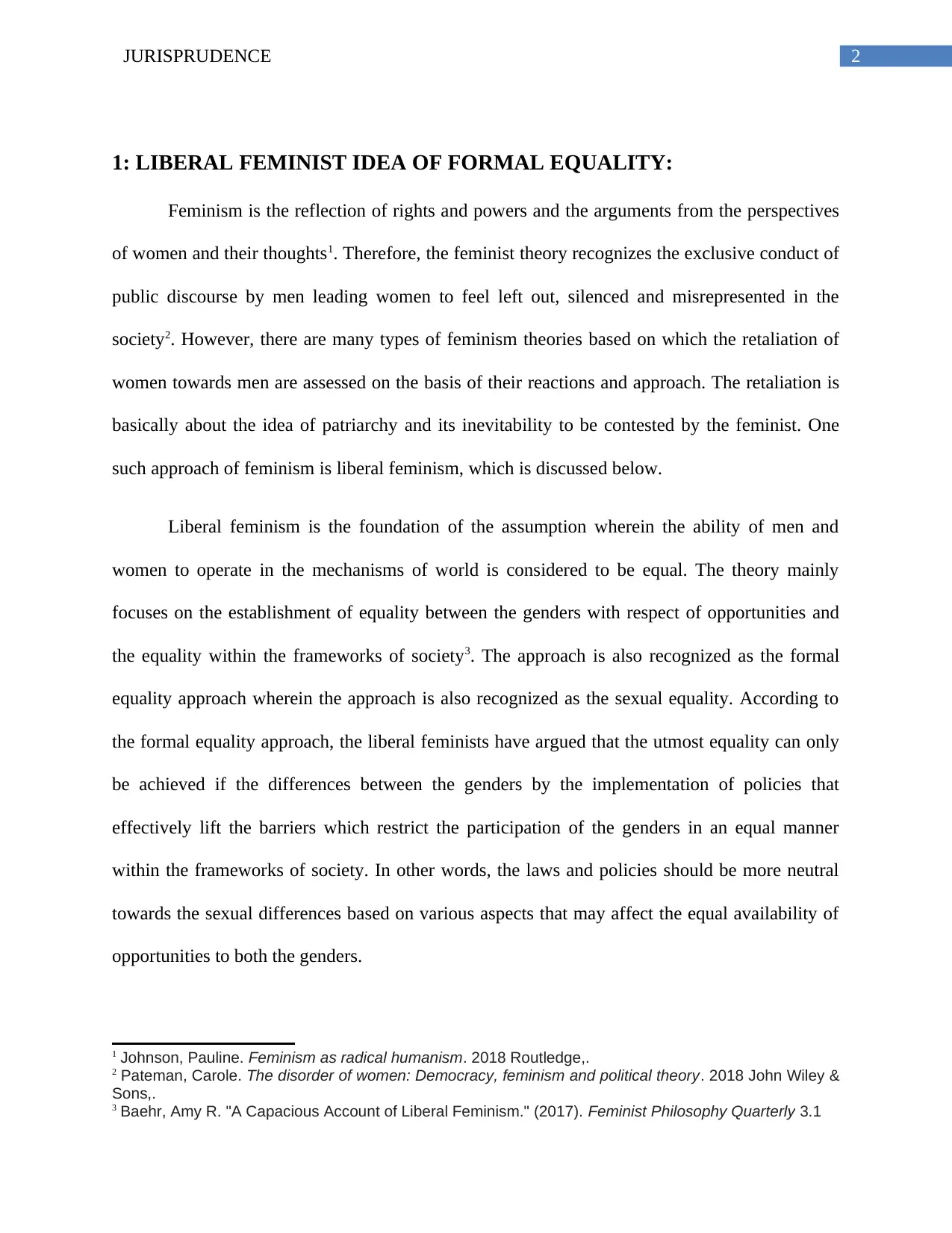
2JURISPRUDENCE
1: LIBERAL FEMINIST IDEA OF FORMAL EQUALITY:
Feminism is the reflection of rights and powers and the arguments from the perspectives
of women and their thoughts1. Therefore, the feminist theory recognizes the exclusive conduct of
public discourse by men leading women to feel left out, silenced and misrepresented in the
society2. However, there are many types of feminism theories based on which the retaliation of
women towards men are assessed on the basis of their reactions and approach. The retaliation is
basically about the idea of patriarchy and its inevitability to be contested by the feminist. One
such approach of feminism is liberal feminism, which is discussed below.
Liberal feminism is the foundation of the assumption wherein the ability of men and
women to operate in the mechanisms of world is considered to be equal. The theory mainly
focuses on the establishment of equality between the genders with respect of opportunities and
the equality within the frameworks of society3. The approach is also recognized as the formal
equality approach wherein the approach is also recognized as the sexual equality. According to
the formal equality approach, the liberal feminists have argued that the utmost equality can only
be achieved if the differences between the genders by the implementation of policies that
effectively lift the barriers which restrict the participation of the genders in an equal manner
within the frameworks of society. In other words, the laws and policies should be more neutral
towards the sexual differences based on various aspects that may affect the equal availability of
opportunities to both the genders.
1 Johnson, Pauline. Feminism as radical humanism. 2018 Routledge,.
2 Pateman, Carole. The disorder of women: Democracy, feminism and political theory. 2018 John Wiley &
Sons,.
3 Baehr, Amy R. "A Capacious Account of Liberal Feminism." (2017). Feminist Philosophy Quarterly 3.1
1: LIBERAL FEMINIST IDEA OF FORMAL EQUALITY:
Feminism is the reflection of rights and powers and the arguments from the perspectives
of women and their thoughts1. Therefore, the feminist theory recognizes the exclusive conduct of
public discourse by men leading women to feel left out, silenced and misrepresented in the
society2. However, there are many types of feminism theories based on which the retaliation of
women towards men are assessed on the basis of their reactions and approach. The retaliation is
basically about the idea of patriarchy and its inevitability to be contested by the feminist. One
such approach of feminism is liberal feminism, which is discussed below.
Liberal feminism is the foundation of the assumption wherein the ability of men and
women to operate in the mechanisms of world is considered to be equal. The theory mainly
focuses on the establishment of equality between the genders with respect of opportunities and
the equality within the frameworks of society3. The approach is also recognized as the formal
equality approach wherein the approach is also recognized as the sexual equality. According to
the formal equality approach, the liberal feminists have argued that the utmost equality can only
be achieved if the differences between the genders by the implementation of policies that
effectively lift the barriers which restrict the participation of the genders in an equal manner
within the frameworks of society. In other words, the laws and policies should be more neutral
towards the sexual differences based on various aspects that may affect the equal availability of
opportunities to both the genders.
1 Johnson, Pauline. Feminism as radical humanism. 2018 Routledge,.
2 Pateman, Carole. The disorder of women: Democracy, feminism and political theory. 2018 John Wiley &
Sons,.
3 Baehr, Amy R. "A Capacious Account of Liberal Feminism." (2017). Feminist Philosophy Quarterly 3.1
⊘ This is a preview!⊘
Do you want full access?
Subscribe today to unlock all pages.

Trusted by 1+ million students worldwide
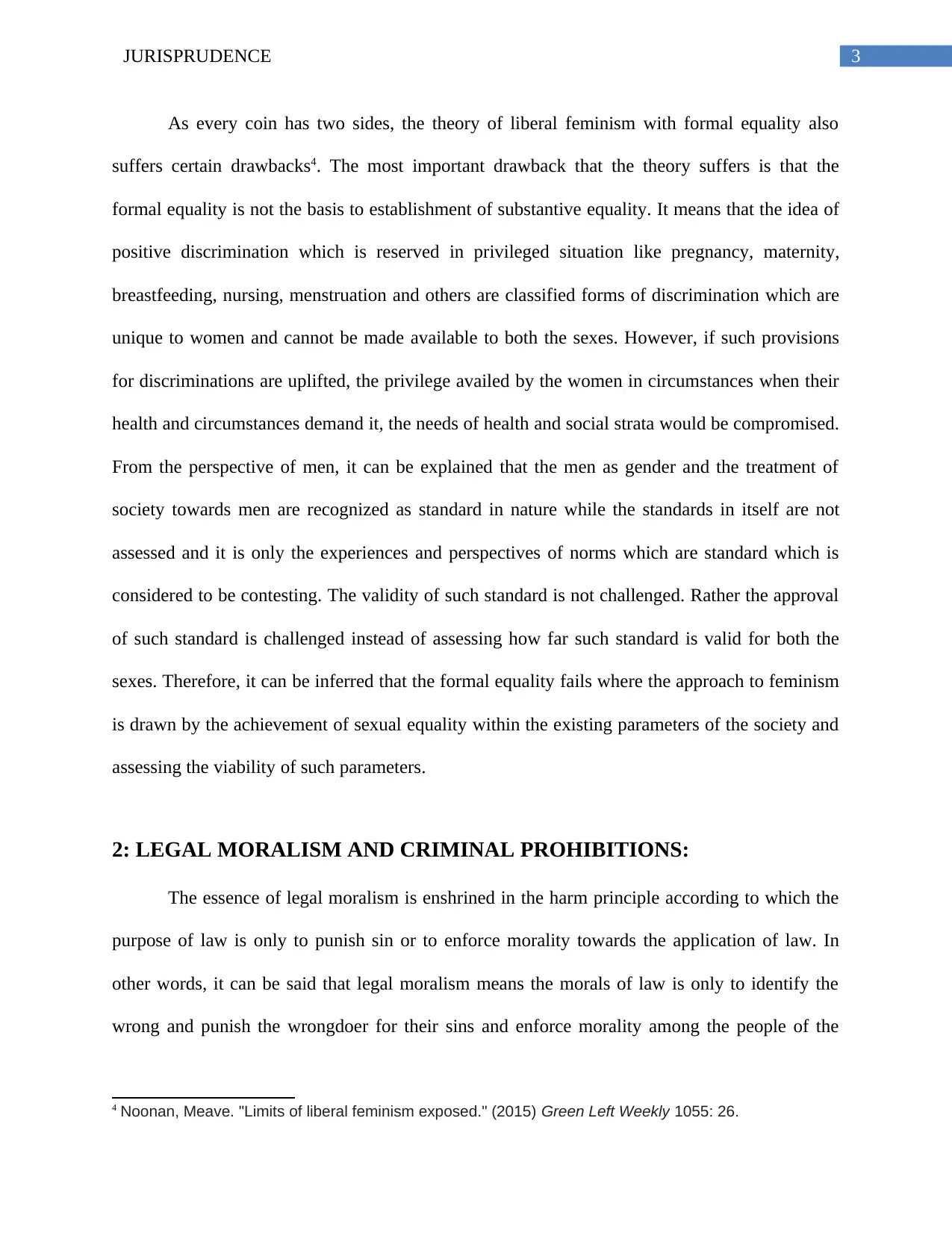
3JURISPRUDENCE
As every coin has two sides, the theory of liberal feminism with formal equality also
suffers certain drawbacks4. The most important drawback that the theory suffers is that the
formal equality is not the basis to establishment of substantive equality. It means that the idea of
positive discrimination which is reserved in privileged situation like pregnancy, maternity,
breastfeeding, nursing, menstruation and others are classified forms of discrimination which are
unique to women and cannot be made available to both the sexes. However, if such provisions
for discriminations are uplifted, the privilege availed by the women in circumstances when their
health and circumstances demand it, the needs of health and social strata would be compromised.
From the perspective of men, it can be explained that the men as gender and the treatment of
society towards men are recognized as standard in nature while the standards in itself are not
assessed and it is only the experiences and perspectives of norms which are standard which is
considered to be contesting. The validity of such standard is not challenged. Rather the approval
of such standard is challenged instead of assessing how far such standard is valid for both the
sexes. Therefore, it can be inferred that the formal equality fails where the approach to feminism
is drawn by the achievement of sexual equality within the existing parameters of the society and
assessing the viability of such parameters.
2: LEGAL MORALISM AND CRIMINAL PROHIBITIONS:
The essence of legal moralism is enshrined in the harm principle according to which the
purpose of law is only to punish sin or to enforce morality towards the application of law. In
other words, it can be said that legal moralism means the morals of law is only to identify the
wrong and punish the wrongdoer for their sins and enforce morality among the people of the
4 Noonan, Meave. "Limits of liberal feminism exposed." (2015) Green Left Weekly 1055: 26.
As every coin has two sides, the theory of liberal feminism with formal equality also
suffers certain drawbacks4. The most important drawback that the theory suffers is that the
formal equality is not the basis to establishment of substantive equality. It means that the idea of
positive discrimination which is reserved in privileged situation like pregnancy, maternity,
breastfeeding, nursing, menstruation and others are classified forms of discrimination which are
unique to women and cannot be made available to both the sexes. However, if such provisions
for discriminations are uplifted, the privilege availed by the women in circumstances when their
health and circumstances demand it, the needs of health and social strata would be compromised.
From the perspective of men, it can be explained that the men as gender and the treatment of
society towards men are recognized as standard in nature while the standards in itself are not
assessed and it is only the experiences and perspectives of norms which are standard which is
considered to be contesting. The validity of such standard is not challenged. Rather the approval
of such standard is challenged instead of assessing how far such standard is valid for both the
sexes. Therefore, it can be inferred that the formal equality fails where the approach to feminism
is drawn by the achievement of sexual equality within the existing parameters of the society and
assessing the viability of such parameters.
2: LEGAL MORALISM AND CRIMINAL PROHIBITIONS:
The essence of legal moralism is enshrined in the harm principle according to which the
purpose of law is only to punish sin or to enforce morality towards the application of law. In
other words, it can be said that legal moralism means the morals of law is only to identify the
wrong and punish the wrongdoer for their sins and enforce morality among the people of the
4 Noonan, Meave. "Limits of liberal feminism exposed." (2015) Green Left Weekly 1055: 26.
Paraphrase This Document
Need a fresh take? Get an instant paraphrase of this document with our AI Paraphraser
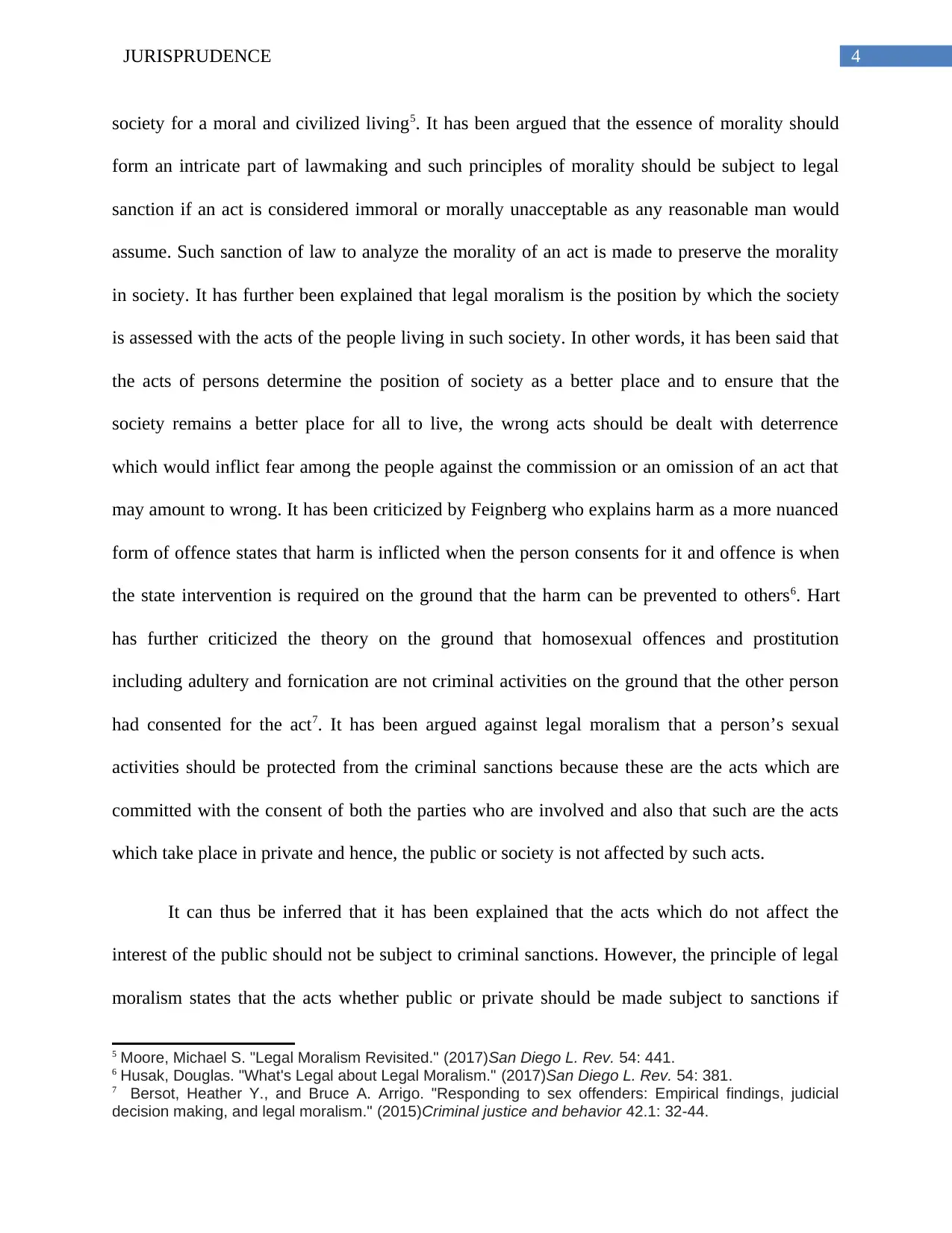
4JURISPRUDENCE
society for a moral and civilized living5. It has been argued that the essence of morality should
form an intricate part of lawmaking and such principles of morality should be subject to legal
sanction if an act is considered immoral or morally unacceptable as any reasonable man would
assume. Such sanction of law to analyze the morality of an act is made to preserve the morality
in society. It has further been explained that legal moralism is the position by which the society
is assessed with the acts of the people living in such society. In other words, it has been said that
the acts of persons determine the position of society as a better place and to ensure that the
society remains a better place for all to live, the wrong acts should be dealt with deterrence
which would inflict fear among the people against the commission or an omission of an act that
may amount to wrong. It has been criticized by Feignberg who explains harm as a more nuanced
form of offence states that harm is inflicted when the person consents for it and offence is when
the state intervention is required on the ground that the harm can be prevented to others6. Hart
has further criticized the theory on the ground that homosexual offences and prostitution
including adultery and fornication are not criminal activities on the ground that the other person
had consented for the act7. It has been argued against legal moralism that a person’s sexual
activities should be protected from the criminal sanctions because these are the acts which are
committed with the consent of both the parties who are involved and also that such are the acts
which take place in private and hence, the public or society is not affected by such acts.
It can thus be inferred that it has been explained that the acts which do not affect the
interest of the public should not be subject to criminal sanctions. However, the principle of legal
moralism states that the acts whether public or private should be made subject to sanctions if
5 Moore, Michael S. "Legal Moralism Revisited." (2017)San Diego L. Rev. 54: 441.
6 Husak, Douglas. "What's Legal about Legal Moralism." (2017)San Diego L. Rev. 54: 381.
7 Bersot, Heather Y., and Bruce A. Arrigo. "Responding to sex offenders: Empirical findings, judicial
decision making, and legal moralism." (2015)Criminal justice and behavior 42.1: 32-44.
society for a moral and civilized living5. It has been argued that the essence of morality should
form an intricate part of lawmaking and such principles of morality should be subject to legal
sanction if an act is considered immoral or morally unacceptable as any reasonable man would
assume. Such sanction of law to analyze the morality of an act is made to preserve the morality
in society. It has further been explained that legal moralism is the position by which the society
is assessed with the acts of the people living in such society. In other words, it has been said that
the acts of persons determine the position of society as a better place and to ensure that the
society remains a better place for all to live, the wrong acts should be dealt with deterrence
which would inflict fear among the people against the commission or an omission of an act that
may amount to wrong. It has been criticized by Feignberg who explains harm as a more nuanced
form of offence states that harm is inflicted when the person consents for it and offence is when
the state intervention is required on the ground that the harm can be prevented to others6. Hart
has further criticized the theory on the ground that homosexual offences and prostitution
including adultery and fornication are not criminal activities on the ground that the other person
had consented for the act7. It has been argued against legal moralism that a person’s sexual
activities should be protected from the criminal sanctions because these are the acts which are
committed with the consent of both the parties who are involved and also that such are the acts
which take place in private and hence, the public or society is not affected by such acts.
It can thus be inferred that it has been explained that the acts which do not affect the
interest of the public should not be subject to criminal sanctions. However, the principle of legal
moralism states that the acts whether public or private should be made subject to sanctions if
5 Moore, Michael S. "Legal Moralism Revisited." (2017)San Diego L. Rev. 54: 441.
6 Husak, Douglas. "What's Legal about Legal Moralism." (2017)San Diego L. Rev. 54: 381.
7 Bersot, Heather Y., and Bruce A. Arrigo. "Responding to sex offenders: Empirical findings, judicial
decision making, and legal moralism." (2015)Criminal justice and behavior 42.1: 32-44.
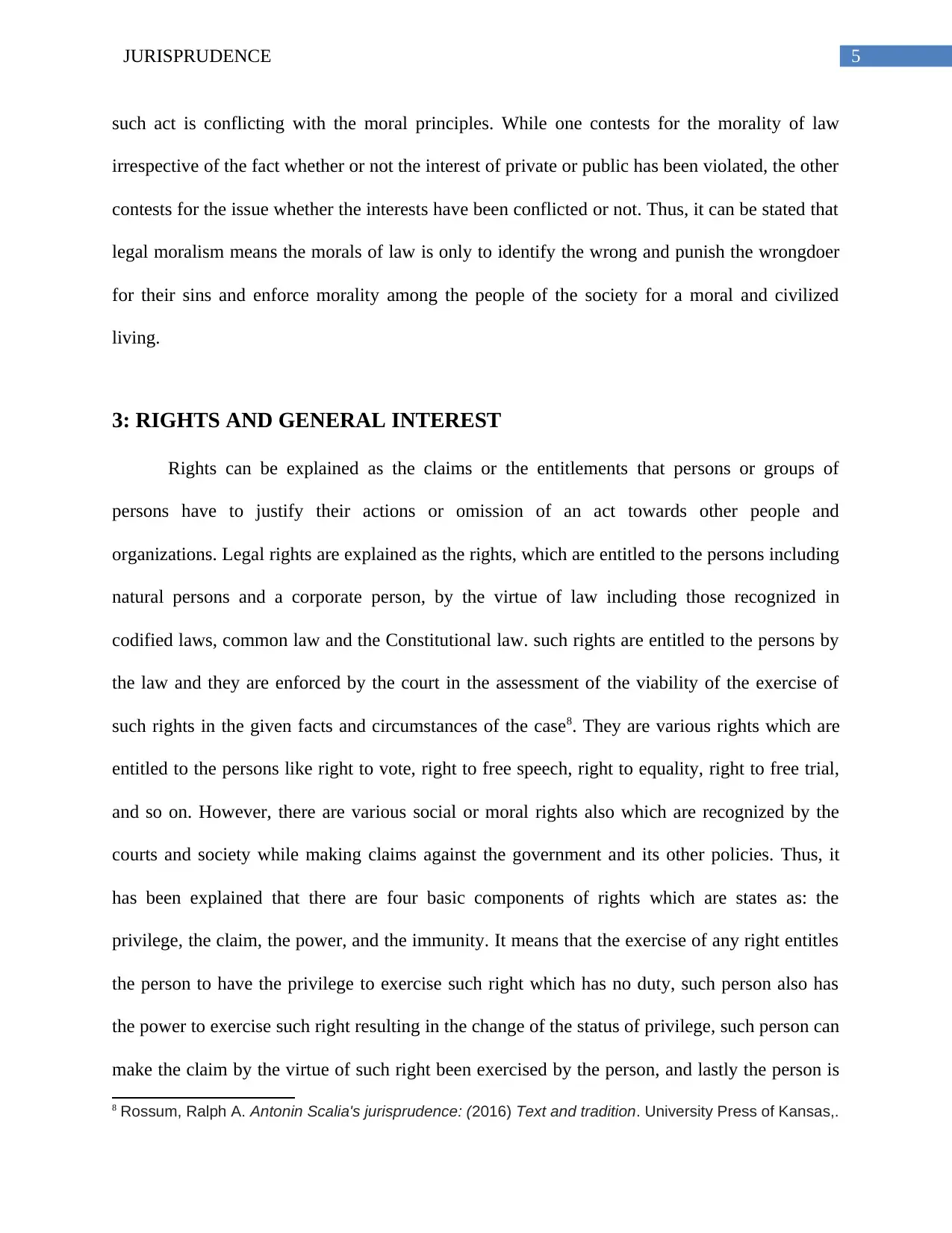
5JURISPRUDENCE
such act is conflicting with the moral principles. While one contests for the morality of law
irrespective of the fact whether or not the interest of private or public has been violated, the other
contests for the issue whether the interests have been conflicted or not. Thus, it can be stated that
legal moralism means the morals of law is only to identify the wrong and punish the wrongdoer
for their sins and enforce morality among the people of the society for a moral and civilized
living.
3: RIGHTS AND GENERAL INTEREST
Rights can be explained as the claims or the entitlements that persons or groups of
persons have to justify their actions or omission of an act towards other people and
organizations. Legal rights are explained as the rights, which are entitled to the persons including
natural persons and a corporate person, by the virtue of law including those recognized in
codified laws, common law and the Constitutional law. such rights are entitled to the persons by
the law and they are enforced by the court in the assessment of the viability of the exercise of
such rights in the given facts and circumstances of the case8. They are various rights which are
entitled to the persons like right to vote, right to free speech, right to equality, right to free trial,
and so on. However, there are various social or moral rights also which are recognized by the
courts and society while making claims against the government and its other policies. Thus, it
has been explained that there are four basic components of rights which are states as: the
privilege, the claim, the power, and the immunity. It means that the exercise of any right entitles
the person to have the privilege to exercise such right which has no duty, such person also has
the power to exercise such right resulting in the change of the status of privilege, such person can
make the claim by the virtue of such right been exercised by the person, and lastly the person is
8 Rossum, Ralph A. Antonin Scalia's jurisprudence: (2016) Text and tradition. University Press of Kansas,.
such act is conflicting with the moral principles. While one contests for the morality of law
irrespective of the fact whether or not the interest of private or public has been violated, the other
contests for the issue whether the interests have been conflicted or not. Thus, it can be stated that
legal moralism means the morals of law is only to identify the wrong and punish the wrongdoer
for their sins and enforce morality among the people of the society for a moral and civilized
living.
3: RIGHTS AND GENERAL INTEREST
Rights can be explained as the claims or the entitlements that persons or groups of
persons have to justify their actions or omission of an act towards other people and
organizations. Legal rights are explained as the rights, which are entitled to the persons including
natural persons and a corporate person, by the virtue of law including those recognized in
codified laws, common law and the Constitutional law. such rights are entitled to the persons by
the law and they are enforced by the court in the assessment of the viability of the exercise of
such rights in the given facts and circumstances of the case8. They are various rights which are
entitled to the persons like right to vote, right to free speech, right to equality, right to free trial,
and so on. However, there are various social or moral rights also which are recognized by the
courts and society while making claims against the government and its other policies. Thus, it
has been explained that there are four basic components of rights which are states as: the
privilege, the claim, the power, and the immunity. It means that the exercise of any right entitles
the person to have the privilege to exercise such right which has no duty, such person also has
the power to exercise such right resulting in the change of the status of privilege, such person can
make the claim by the virtue of such right been exercised by the person, and lastly the person is
8 Rossum, Ralph A. Antonin Scalia's jurisprudence: (2016) Text and tradition. University Press of Kansas,.
⊘ This is a preview!⊘
Do you want full access?
Subscribe today to unlock all pages.

Trusted by 1+ million students worldwide
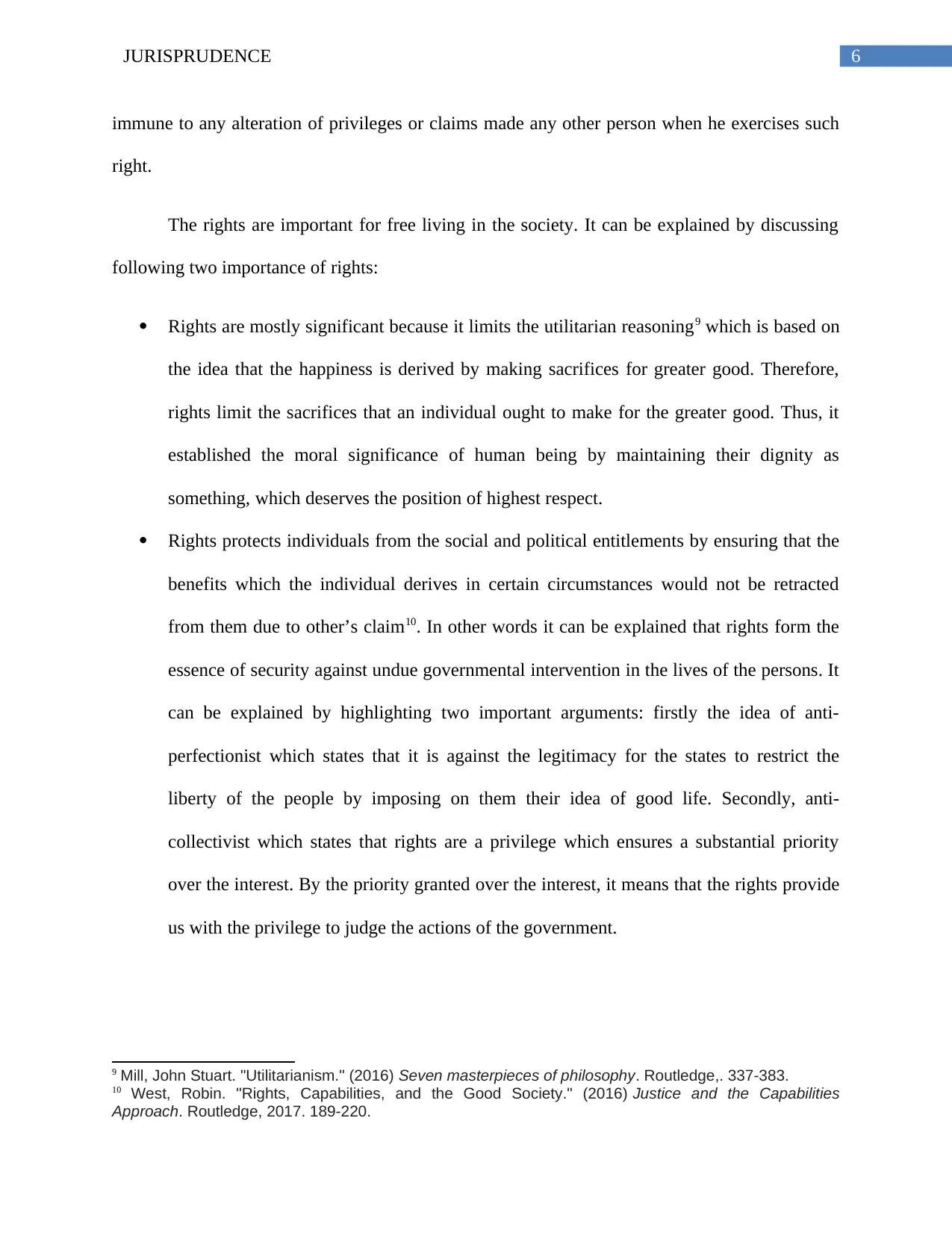
6JURISPRUDENCE
immune to any alteration of privileges or claims made any other person when he exercises such
right.
The rights are important for free living in the society. It can be explained by discussing
following two importance of rights:
Rights are mostly significant because it limits the utilitarian reasoning9 which is based on
the idea that the happiness is derived by making sacrifices for greater good. Therefore,
rights limit the sacrifices that an individual ought to make for the greater good. Thus, it
established the moral significance of human being by maintaining their dignity as
something, which deserves the position of highest respect.
Rights protects individuals from the social and political entitlements by ensuring that the
benefits which the individual derives in certain circumstances would not be retracted
from them due to other’s claim10. In other words it can be explained that rights form the
essence of security against undue governmental intervention in the lives of the persons. It
can be explained by highlighting two important arguments: firstly the idea of anti-
perfectionist which states that it is against the legitimacy for the states to restrict the
liberty of the people by imposing on them their idea of good life. Secondly, anti-
collectivist which states that rights are a privilege which ensures a substantial priority
over the interest. By the priority granted over the interest, it means that the rights provide
us with the privilege to judge the actions of the government.
9 Mill, John Stuart. "Utilitarianism." (2016) Seven masterpieces of philosophy. Routledge,. 337-383.
10 West, Robin. "Rights, Capabilities, and the Good Society." (2016) Justice and the Capabilities
Approach. Routledge, 2017. 189-220.
immune to any alteration of privileges or claims made any other person when he exercises such
right.
The rights are important for free living in the society. It can be explained by discussing
following two importance of rights:
Rights are mostly significant because it limits the utilitarian reasoning9 which is based on
the idea that the happiness is derived by making sacrifices for greater good. Therefore,
rights limit the sacrifices that an individual ought to make for the greater good. Thus, it
established the moral significance of human being by maintaining their dignity as
something, which deserves the position of highest respect.
Rights protects individuals from the social and political entitlements by ensuring that the
benefits which the individual derives in certain circumstances would not be retracted
from them due to other’s claim10. In other words it can be explained that rights form the
essence of security against undue governmental intervention in the lives of the persons. It
can be explained by highlighting two important arguments: firstly the idea of anti-
perfectionist which states that it is against the legitimacy for the states to restrict the
liberty of the people by imposing on them their idea of good life. Secondly, anti-
collectivist which states that rights are a privilege which ensures a substantial priority
over the interest. By the priority granted over the interest, it means that the rights provide
us with the privilege to judge the actions of the government.
9 Mill, John Stuart. "Utilitarianism." (2016) Seven masterpieces of philosophy. Routledge,. 337-383.
10 West, Robin. "Rights, Capabilities, and the Good Society." (2016) Justice and the Capabilities
Approach. Routledge, 2017. 189-220.
Paraphrase This Document
Need a fresh take? Get an instant paraphrase of this document with our AI Paraphraser
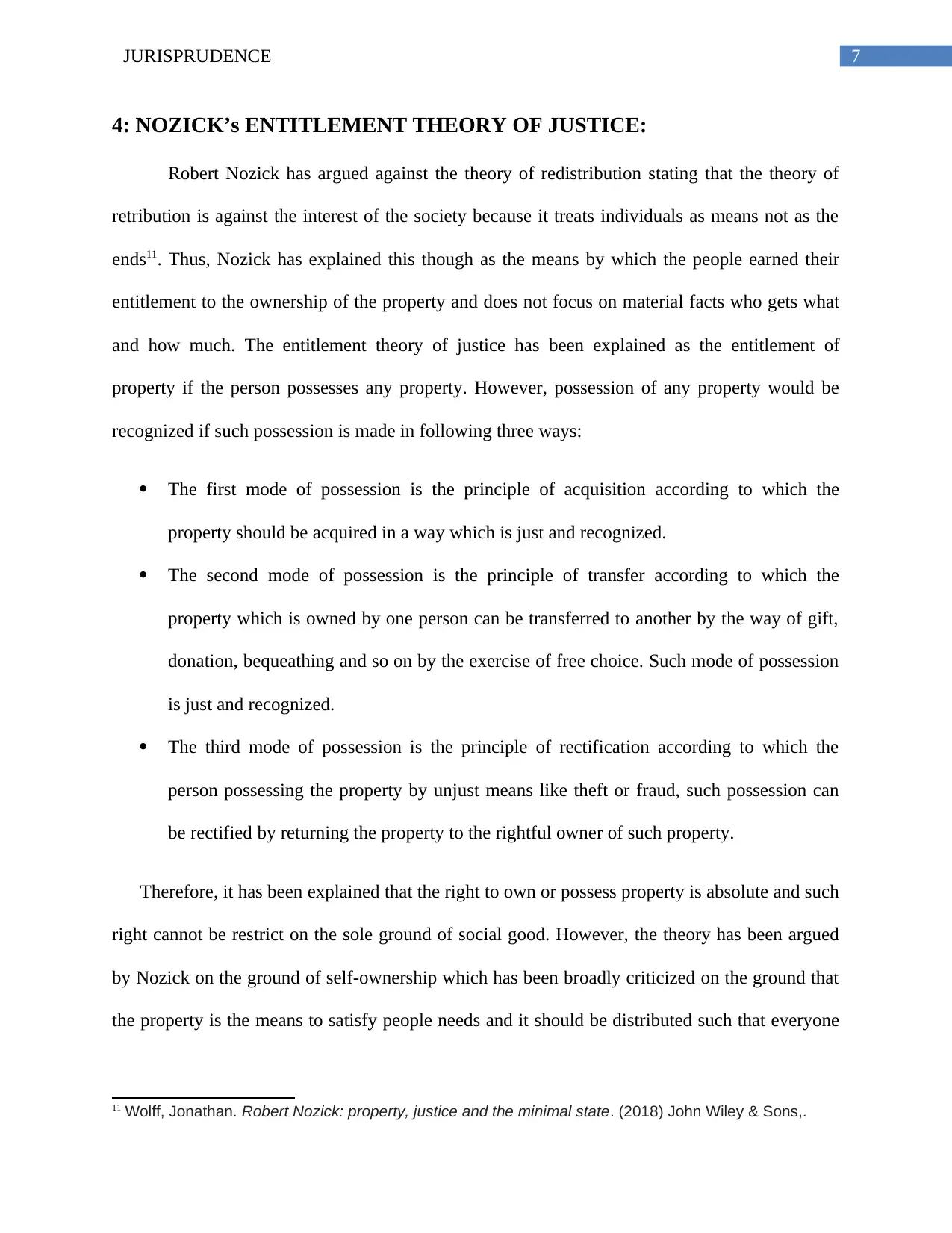
7JURISPRUDENCE
4: NOZICK’s ENTITLEMENT THEORY OF JUSTICE:
Robert Nozick has argued against the theory of redistribution stating that the theory of
retribution is against the interest of the society because it treats individuals as means not as the
ends11. Thus, Nozick has explained this though as the means by which the people earned their
entitlement to the ownership of the property and does not focus on material facts who gets what
and how much. The entitlement theory of justice has been explained as the entitlement of
property if the person possesses any property. However, possession of any property would be
recognized if such possession is made in following three ways:
The first mode of possession is the principle of acquisition according to which the
property should be acquired in a way which is just and recognized.
The second mode of possession is the principle of transfer according to which the
property which is owned by one person can be transferred to another by the way of gift,
donation, bequeathing and so on by the exercise of free choice. Such mode of possession
is just and recognized.
The third mode of possession is the principle of rectification according to which the
person possessing the property by unjust means like theft or fraud, such possession can
be rectified by returning the property to the rightful owner of such property.
Therefore, it has been explained that the right to own or possess property is absolute and such
right cannot be restrict on the sole ground of social good. However, the theory has been argued
by Nozick on the ground of self-ownership which has been broadly criticized on the ground that
the property is the means to satisfy people needs and it should be distributed such that everyone
11 Wolff, Jonathan. Robert Nozick: property, justice and the minimal state. (2018) John Wiley & Sons,.
4: NOZICK’s ENTITLEMENT THEORY OF JUSTICE:
Robert Nozick has argued against the theory of redistribution stating that the theory of
retribution is against the interest of the society because it treats individuals as means not as the
ends11. Thus, Nozick has explained this though as the means by which the people earned their
entitlement to the ownership of the property and does not focus on material facts who gets what
and how much. The entitlement theory of justice has been explained as the entitlement of
property if the person possesses any property. However, possession of any property would be
recognized if such possession is made in following three ways:
The first mode of possession is the principle of acquisition according to which the
property should be acquired in a way which is just and recognized.
The second mode of possession is the principle of transfer according to which the
property which is owned by one person can be transferred to another by the way of gift,
donation, bequeathing and so on by the exercise of free choice. Such mode of possession
is just and recognized.
The third mode of possession is the principle of rectification according to which the
person possessing the property by unjust means like theft or fraud, such possession can
be rectified by returning the property to the rightful owner of such property.
Therefore, it has been explained that the right to own or possess property is absolute and such
right cannot be restrict on the sole ground of social good. However, the theory has been argued
by Nozick on the ground of self-ownership which has been broadly criticized on the ground that
the property is the means to satisfy people needs and it should be distributed such that everyone
11 Wolff, Jonathan. Robert Nozick: property, justice and the minimal state. (2018) John Wiley & Sons,.
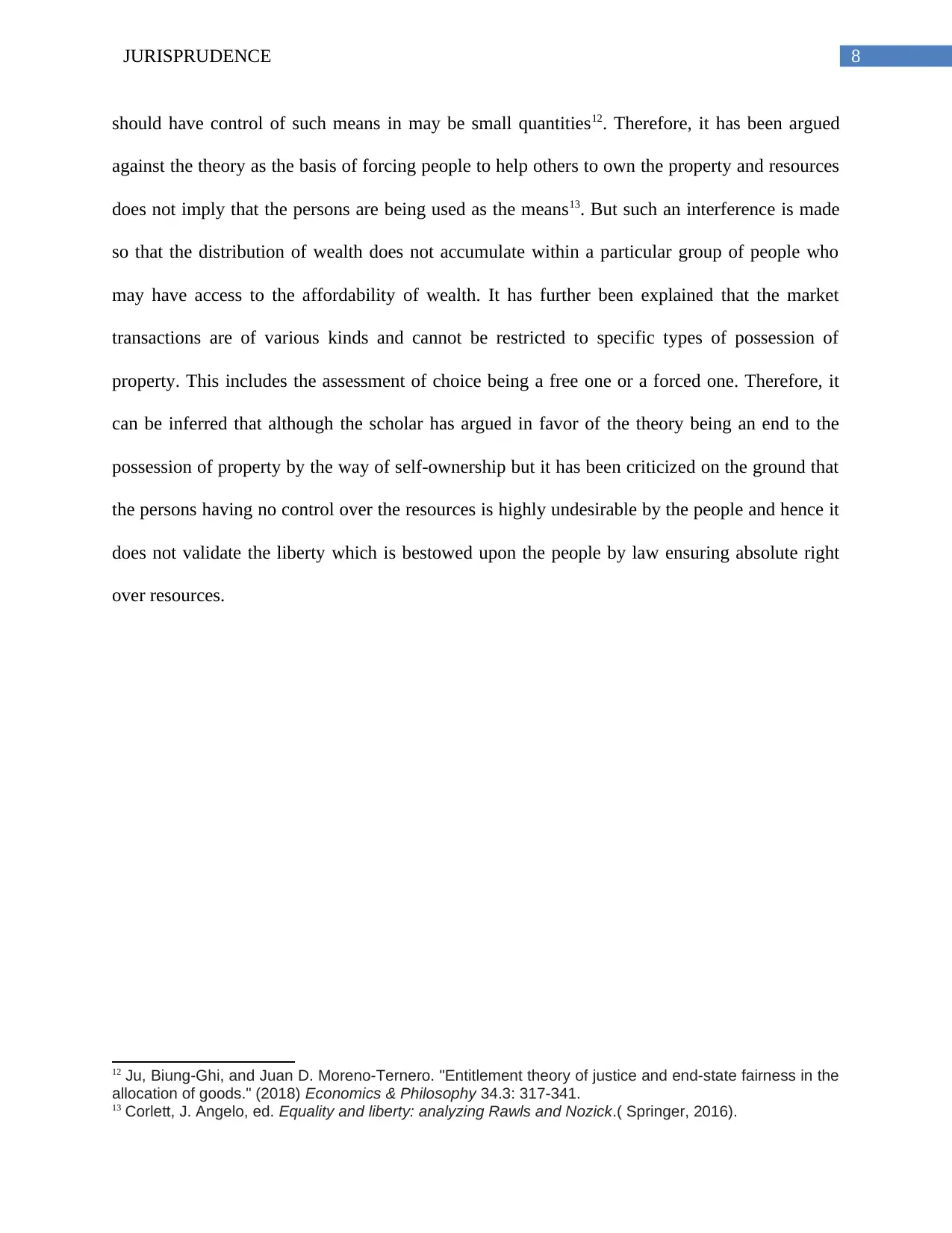
8JURISPRUDENCE
should have control of such means in may be small quantities12. Therefore, it has been argued
against the theory as the basis of forcing people to help others to own the property and resources
does not imply that the persons are being used as the means13. But such an interference is made
so that the distribution of wealth does not accumulate within a particular group of people who
may have access to the affordability of wealth. It has further been explained that the market
transactions are of various kinds and cannot be restricted to specific types of possession of
property. This includes the assessment of choice being a free one or a forced one. Therefore, it
can be inferred that although the scholar has argued in favor of the theory being an end to the
possession of property by the way of self-ownership but it has been criticized on the ground that
the persons having no control over the resources is highly undesirable by the people and hence it
does not validate the liberty which is bestowed upon the people by law ensuring absolute right
over resources.
12 Ju, Biung-Ghi, and Juan D. Moreno-Ternero. "Entitlement theory of justice and end-state fairness in the
allocation of goods." (2018) Economics & Philosophy 34.3: 317-341.
13 Corlett, J. Angelo, ed. Equality and liberty: analyzing Rawls and Nozick.( Springer, 2016).
should have control of such means in may be small quantities12. Therefore, it has been argued
against the theory as the basis of forcing people to help others to own the property and resources
does not imply that the persons are being used as the means13. But such an interference is made
so that the distribution of wealth does not accumulate within a particular group of people who
may have access to the affordability of wealth. It has further been explained that the market
transactions are of various kinds and cannot be restricted to specific types of possession of
property. This includes the assessment of choice being a free one or a forced one. Therefore, it
can be inferred that although the scholar has argued in favor of the theory being an end to the
possession of property by the way of self-ownership but it has been criticized on the ground that
the persons having no control over the resources is highly undesirable by the people and hence it
does not validate the liberty which is bestowed upon the people by law ensuring absolute right
over resources.
12 Ju, Biung-Ghi, and Juan D. Moreno-Ternero. "Entitlement theory of justice and end-state fairness in the
allocation of goods." (2018) Economics & Philosophy 34.3: 317-341.
13 Corlett, J. Angelo, ed. Equality and liberty: analyzing Rawls and Nozick.( Springer, 2016).
⊘ This is a preview!⊘
Do you want full access?
Subscribe today to unlock all pages.

Trusted by 1+ million students worldwide
1 out of 9
Related Documents
Your All-in-One AI-Powered Toolkit for Academic Success.
+13062052269
info@desklib.com
Available 24*7 on WhatsApp / Email
![[object Object]](/_next/static/media/star-bottom.7253800d.svg)
Unlock your academic potential
Copyright © 2020–2026 A2Z Services. All Rights Reserved. Developed and managed by ZUCOL.





